| Conditions:
Education |
|
To us, education seemed to the
be the most impressive success of the revolution. This is one
of the small, rural schools that are everywhere in the country.
Whatever the revolutionary government's failings may be, we
do not question its commitment to education.
|
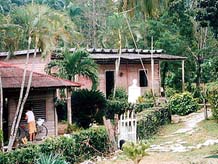
|
|
A true story: in 1960, less than
a year after their victory, Castro's government decided to wipe
out illiteracy. They recruited 120,000 volunteer teachers, most
of them young high school students. Armed only with books and
Coleman-style gas lanterns, the volunteers entered the most
remote areas, teaching peasants of all ages to read. The grim
part of the story was that there were still counterrevolutionaries
in the hills -- and they received support from the CIA. They
knew the literacy brigades were helping solidify Castro's support
among the peasantry, so the young volunteers were terrorized
and at least one was murdered. But the campaign succeeded anyway.
Practically overnight, Cuba's literacy rate rose to 97%, and
it's now a little higher than that. By the way, the average
Cuban's knowledge of the U.S. and of world events is astonishing.
|
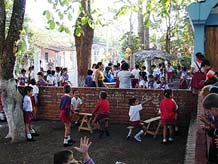
|
This is a school we visited in
Pinar del Rio. It is 8 a.m. on a Friday morning, just before
the school day starts. Many parents are here, because Fridays
are special. There is an important assembly at the start of
the school that day.
|
|
We were staying in the home of
this first-grade teacher. She invited us to the school. Here,
her first grade class is lining up for the assembly.
|
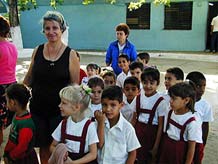
|
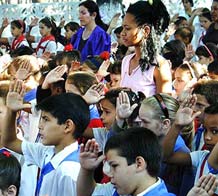
|
At the assembly these earnest
children are reciting and hearing poems and essays by and about
their country's leaders throughout history. Are their minds
being filled with propoganda? No doubt about it! In the
U.S., we would call it "values education." Perhaps surprisingly,
the values Cuban children are being taught are not very different
from those we wish American children would learn -- hard work,
self discipline, and love of country. But there is a lot more
emphasis on the common good and less on individualism and personal
success.
|
|
The man with Barbara is named
Jose. He began working in an orchid garden at 16. The manager
of the gardens noticed that Jose loved to draw pictures of flowers
-- and Jose was good at it. The manager arranged for him to
study botanical illustration in Mexico. Now Jose's book on the
orchids of Cuba has been published in Spain. He still works
in the orchid gardens, but now he leads tours because he has
learned so much English, and he has his own studio there.
|
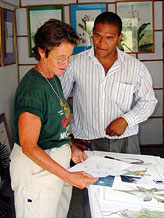
|
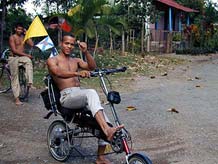
|
This picture suggests another
education story. We met this young man in the countryside. He
was wearing ragged shoes, and they embarrassed him so much that
he took them off for the photo. He'd been working in the fields
of his peasant family's farm -- but it turned out that he was
home for the weekend from the university prep school in Santiago
de Cuba. He will go on for a free university education -- and
quite possibly to grad school as well.
|
|
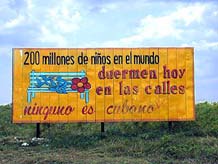 Cuba
is full of suprises and paradoxes. We met young people who were
desperate to leave the country to seek a better life, and others
who said, "I don't understand these people who want to leave.
This is a wonderful country. It is our family." Cuba
is full of suprises and paradoxes. We met young people who were
desperate to leave the country to seek a better life, and others
who said, "I don't understand these people who want to leave.
This is a wonderful country. It is our family."
We got to know a highly-educated,
solidly middle-class family who were all staunch supporters
of the government, still determined to do their part in making
the revolution a success; and another family in similar circumstances,
just a few doors away, who were outspokenly hostile to Castro's
government.
Barbara and I have mixed feelings,
but we do admire some of the things that Cuba has achieved,
and we think the U.S. can learn a great deal from Cuba. This
sign near Trinidad summed up a lot for us. It says, "200,000,000
children in the world will sleep in the streets today. None
of them is Cuban."
|
|





